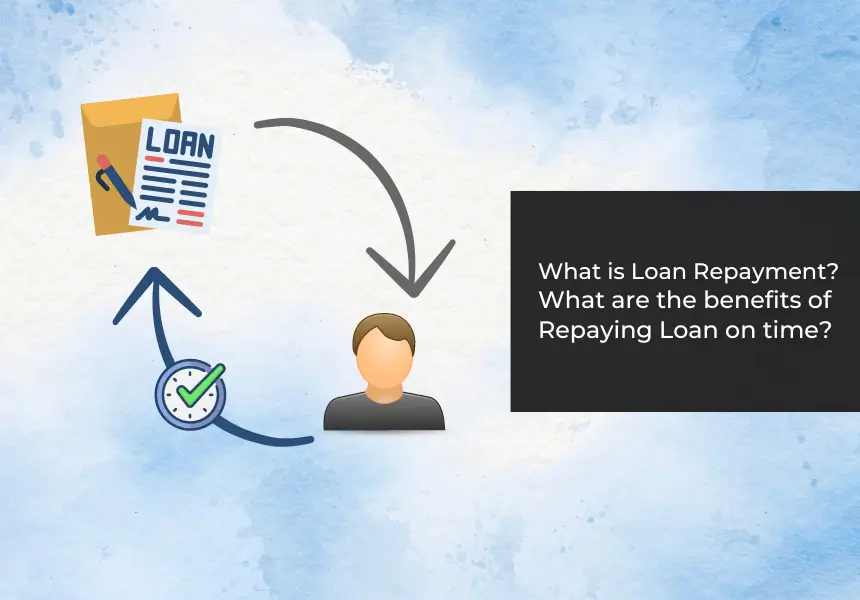
Loan repayment is a fundamental aspect of financial responsibility and stability. It involves returning borrowed funds and any accrued interest within a specified timeframe. Whether acquiring an instant personal loan, a wedding loan, or a holiday loan, understanding loan repayment is crucial for borrowers.
Timely repayment ensures the fulfillment of financial obligations and helps maintain a good credit score, which is important for future financial endeavors.
Understanding the dynamics of loan repayment enables individuals to make informed decisions regarding borrowing, budgeting, and financial planning. It also enables people to prudently and strategically negotiate the complexities of personal finance.
What is Loan Repayment?
Loan repayment means returning borrowed funds to the lender according to predetermined terms and conditions. It encompasses repaying the principal amount borrowed and any accrued interest over the loan’s duration. This financial obligation arises when a borrower avails of any loan, including mortgages and personal, student, and business loans.
Loan repayment schedules typically outline the frequency and amount of payments required. Adhering to these repayment obligations is crucial for borrowers to fulfill their contractual agreements and maintain a good credit history.
Understanding loan repayment terms and diligently meeting payment deadlines are essential for responsible financial management. They ensure borrowers can successfully manage their debts and achieve long-term financial goals.
Benefits Of Repaying Loan On Time
Debt Freedom
On-time repayment allows you to clear your debts according to the agreed-upon schedule. You progressively lower the outstanding sum as you make regular payments, eventually paying the debt in full. Achieving debt freedom relieves the financial burden of owing money and frees up your income for other purposes, such as saving for the future or investing in assets.
Improved Credit Score
Your payment history heavily affects your credit score. Making timely loan payments demonstrates responsible financial behavior to credit reporting agencies. As a result, your credit score improves, making you a more attractive borrower to lenders. A higher credit score increases your chances of being approved for future loans and allows you to qualify for better personal loan interest rates and terms, saving you money in the long run.
Enhanced Financial Planning
When you repay your loans on time, you gain better control over your finances. You know exactly how much money you need to set aside monthly for loan payments, allowing you to create a more accurate budget and financial plan. This foresight enables you to allocate your resources efficiently, whether it’s for essential expenses, saving goals, or discretionary spending, helping you stay on track towards your financial objectives.
Avoid Late Payment Fees
Late fees for missing loan payments can add up quickly and raise the total cost of borrowing. By making timely payments, you avoid these unnecessary fees, preserving your hard-earned money for other purposes. Additionally, avoiding late payments helps maintain a positive relationship with your lender, reducing the risk of adverse actions, such as loan default or collection proceedings.
Flexibility to Pursue Other Opportunities
Successfully repaying your loans opens up opportunities for future financial endeavors. A positive payment history enhances your creditworthiness, making qualifying for new loans or lines of credit easier. Whether pursuing further education, starting a business, or investing in real estate, having a solid credit profile gives you the flexibility and leverage to seize opportunities as they arise, ultimately contributing to your long-term financial success.
How Repayment Works
Lenders anticipate that borrowers who take out loans will probably pay back the amount. From the time a loan is disbursed until it is settled, interest is assessed at a certain rate and on a predetermined schedule. Financial organisations miss out on other potentially profitable investment opportunities when they provide loans. The interest payments compensate them for these opportunity costs and the loan risks. Interest rates are often displayed as an annual percentage rate.
The type of loan and the lender are the determining factors in repayment schedules. It is important to read the sections of the loan agreement that describe your alternatives if you cannot make planned payments, whether you are applying for a loan or paying it off. If borrowers are unable to repay their debts, they may file for bankruptcy. Since it will have a big impact on your future ability to take out loans, it would be advisable to investigate this as a last resort.
Methods of Loan Repayment
Methods of loan repayment encompass various strategies tailored to meet borrowers’ financial needs and preferences:
Equated Monthly Installment (EMI)
This method involves paying a fixed monthly amount comprising both principal and interest. EMIs remain constant throughout the loan tenure, simplifying budgeting for borrowers.
Step-up Repayment
In this approach, borrowers start with lower EMIs that gradually increase. It suits individuals expecting income growth in the future, allowing them to manage lower payments initially.
Bullet Repayment
Under this method, borrowers repay only the interest throughout the loan tenure, with the principal amount paid in full at maturity. It’s common in short-term loans or bridge financing.
Part-Prepayment and Foreclosure
Through part-prepayment, borrowers can repay a portion of their outstanding loan amount. Foreclosure refers to settling the entire outstanding loan amount in a lump sum before the agreed-upon term ends. Both options may attract a fee, but can help reduce interest costs and achieve debt freedom sooner.
Conclusion
Loan repayment includes paying back borrowed funds to the lender, including interest, within agreed-upon terms and schedules. Timely repayment not only fulfills contractual obligations but also offers numerous benefits.
These include debt freedom, improved credit score, enhanced financial planning capabilities, avoidance of late payment fees, reduced stress, and flexibility to pursue other opportunities.
Understanding the various loan repayment methods, such as Equated Monthly Installment (EMI), and Prepayment, empowers borrowers to choose the most suitable strategy for their financial situation and goals.
Overall, prioritizing timely loan repayment fosters financial stability, builds creditworthiness, and paves the way for achieving long-term financial success and security. It’s crucial in maintaining healthy financial habits and securing a brighter financial future.
FAQs
How does loan repayment contribute to financial stability?
Ans. Timely loan repayment demonstrates responsible financial management, reduces debt burden, improves creditworthiness, and ultimately contributes to long-term financial stability and security.
Can I refinance my loan to lower my monthly payments?
Ans. Yes, refinancing means taking out a new loan instead of the old one, usually with better terms—like lower interest rates or longer repayment terms that translate into smaller monthly payments.
What is the difference between part-prepayment and foreclosure?
Ans. Part-prepayment involves paying off a portion of the outstanding loan amount , while foreclosure is settling the entire outstanding loan amount in a lump sum.








